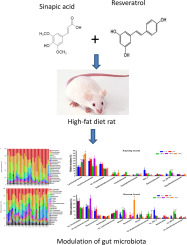Food Research International ( IF 7.0 ) Pub Date : 2018-10-04 , DOI: 10.1016/j.foodres.2018.10.003 Chen Yang , Qianchun Deng , Jiqu Xu , Xu Wang , Chao Hu , Hu Tang , Fenghong Huang

|
High-fat diet (HFD) consumption induces oxidative stress and microbial dysbiosis, the latter of which plays a vital role in the development of metabolic syndrome. We hypothesized that sinapic acid and resveratrol treatment might be a potential strategy to ameliorate the redox state and gut microbiota composition imbalance. In this study, rats were randomised into five groups and fed a high-fat diet supplemented with resveratrol (400 mg/kg), sinapic acid (200 mg/kg) or a combination of both polyphenols. Administration of resveratrol effectively reduced fasting blood glucose levels (p < 0.05) and increased the HDL-c levels (p < 0.05). Reactive oxygen species and malondialdehyde levels were decreased in the colon (p < 0.05), total antioxidant capacity was increased in liver (p < 0.05) by sinapic acid consumption in HFD rats. Moreover, polyphenol supplementation impacted the intestinal microbiome at different taxonomic levels by improving the proportion of butyrate acid producer Blautia (p < 0.05) and Dorea (p < 0.01) in the Lachaospiraceae family and inhibiting the growth of bacterial species associated with diseases and inflammation such as Bacteroides (p < 0.05) and Desulfovibrionaceaesp (p < 0.01). Spearman correlation analysis showed that some oxidative stress variables were directly correlated with changes in gut microbiota. Our findings demonstrated qualitative differences between the treatments in their abilities to alleviate HFD-induced oxidative stress and modulate the gut microbiota. These findings might be helpful to better understand the effects of bioactive constituents on nutrition for human health.
中文翻译:

芥酸和白藜芦醇通过调节高脂饮食喂养大鼠肠道菌群减轻氧化应激
高脂饮食(HFD)的摄入会引起氧化应激和微生物代谢异常,后者在代谢综合征的发展中起着至关重要的作用。我们假设芥子酸和白藜芦醇治疗可能是改善氧化还原状态和肠道菌群组成失衡的潜在策略。在这项研究中,将大鼠随机分为五组,并喂养高脂饮食,补充白藜芦醇(400 mg / kg),芥子酸(200 mg / kg)或两种多酚的组合。白藜芦醇的给药有效降低了空腹血糖水平(p <0.05),并增加了HDL-c水平(p <0.05)。结肠的活性氧和丙二醛水平降低(p <0.05),通过摄入HFD大鼠中的芥子酸,肝脏的总抗氧化能力增加(p <0.05)。此外,多酚补充剂通过提高Lachaospiraceae家族中丁酸生产者Blautia(p <0.05)和Dorea(p <0.01)的比例,并抑制与疾病和炎症相关的细菌种类的生长,从而在不同的分类学水平上影响了肠道微生物组。如拟杆菌(p <0.05)和脱硫弧菌科(p <0.01)。Spearman相关分析表明,某些氧化应激变量与肠道菌群的变化直接相关。我们的发现表明,治疗在缓解HFD诱导的氧化应激和调节肠道菌群能力上在质量上存在差异。这些发现可能有助于更好地了解生物活性成分对人类健康营养的影响。











































 京公网安备 11010802027423号
京公网安备 11010802027423号